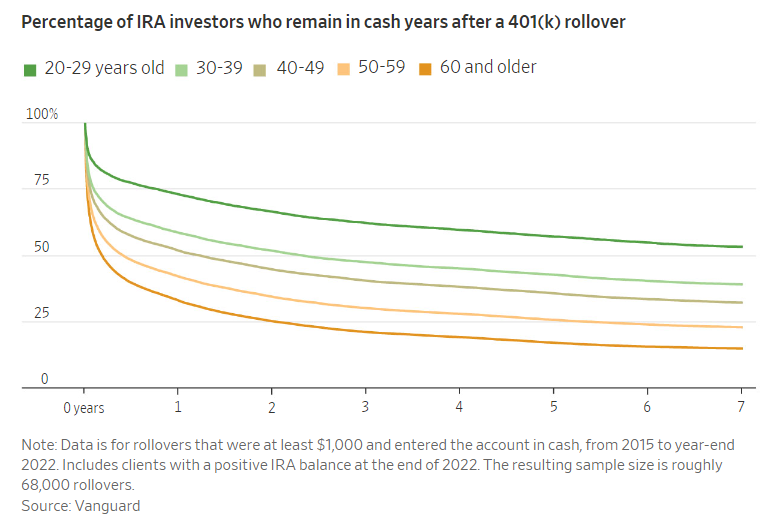Workers miss out on billions in investment gains by pulling retirement savings out of the stock market after switching jobs—often without meaning to.
When people roll 401(k) balances from their old company’s plan into an individual retirement account, the money is frequently held as cash until they select new investments. Many never do, according to new research from Vanguard Group. Nearly a third who rolled savings into IRAs at Vanguard in 2015 still had the balance sitting in cash seven years later.
 iStock image
iStock image
Americans with cash-heavy IRAs give up more than $172 billion a year in retirement wealth they could have generated by investing in stocks and bonds, the Vanguard study estimates.
The mistake is common and costly, especially for younger workers accustomed to their savings being automatically invested in company plans. They risk missing out on years of potential gains, which compound over decades and build retirement wealth.
The issue is important to older savers, too, who tend to need some exposure to stocks to ensure their money lasts, financial advisers said.
The huge sums unintentionally kept in cash are a growing concern since IRAs have become the dominant way in which Americans hold their retirement savings, said Fiona Greig, global head of investor research and policy at Vanguard and a co-author of the study. IRAs have $14.3 trillion in assets, versus $11.1 trillion in 401(k)-type plans, according to the Investment Company Institute, the fund industry’s trade association.
Brie Pio, a financial adviser in Rockport, Maine, said a couple who hired her in 2021 had rolled more than $400,000 over from a 401(k) to an IRA the year before. It took them a while to realize the money was sitting in cash.
“They couldn’t figure out why they weren’t earning any money when the stock market was showing high returns,” said Pio, who estimated the couple lost about $100,000 by missing the rally.
Cashing out
There are several options for handling retirement savings when leaving jobs. You can keep your 401(k) balance with your old company, roll the money into a new employer’s 401(k) plan, or move it into an IRA instead.
An IRA gives savers more options for where to invest their money, but that money usually isn’t automatically invested in the market.
When you roll your 401(k) account into an IRA, the company that administers the 401(k) often sells your holdings, then moves the cash into your IRA.
While rollovers account for a significant portion of the assets in IRAs, some people make annual contributions. Among investors who contributed to an IRA in 2022, more than half stayed in cash for at least 12 months, the Vanguard study found.
Some account owners put off making decisions about where to put the money because they are overwhelmed by the thousands of investment options IRAs offer, said Andy Reed, head of investor behavior research at Vanguard and a co-author of the study.
Others mistakenly assume the company that serves as custodian for their IRA, such as Vanguard or Fidelity Investments, will automatically invest their savings for them, as many 401(k) plans do, Reed said.
Without reminders to move the money out of cash, “a great deal of IRA investors would stay in cash forever,” he said.
In a recent survey of over 500 Vanguard IRA clients who completed a rollover in 2023 but were still in cash in June, 68% didn’t know how their IRA money was invested.

Missing out
Since the Federal Reserve began raising interest rates in 2022, cash-like investments have gotten a boost. Money-market funds now pay annual interest of about 5%, meaning the returns from cash aren’t nearly as bad as they were as recently as 2021, when they were close to zero.
Since 1926, U.S. large-cap stocks have gained an annualized 7.19% after adjusting for inflation, versus 0.31% for cash, according to Morningstar Direct.
Laura Bovard, a 33-year-old nurse from Cincinnati, said she has lost out on thousands of dollars of gains because her IRA has been in cash since 2016.
A former employer rolled her pension into the IRA after she left her job, something companies can do with pensions and 401(k) accounts when the balance is between $1,000 and $7,000. Bovard said she didn’t know about the IRA until recently, when she received a statement.
“It’s not even in a high–yield money-market fund. It’s earning very minimal interest even now,” said Bovard, who is moving the money to her current 401(k)-type plan.
The $3,200 balance would be more than twice as high had the IRA been invested in stocks over the past eight years, according to an estimate by Bovard’s husband, John Bovard, a financial adviser.
Vanguard customers who rolled money over to an IRA in their 20s held cash in those accounts for a median of seven years, compared with five months for investors who rolled over to an IRA at around age 55.
A nudge for IRAs
As baby boomers retire and younger workers switch jobs, the dollars moved to IRAs from 401(k)-type accounts ballooned to $701 billion in 2023, up from $404 billion in 2013, according to research and consulting firm Cerulli Associates.
The researchers at Vanguard want policymakers to address the cash issue by extending to IRAs the legal protections available under a 2006 law that allows 401(k) plans to automatically enroll workers in diversified portfolios, such as target-date funds.
Vanguard is the largest provider of target-date funds, according to Morningstar.
Such a policy would add more than $100,000 to the average IRA balance by the time an investor under 55 reaches age 65, Vanguard estimates.
Mark Iwry, a former Treasury Department official who oversaw national retirement policy in the Clinton and Obama administrations, said defaulting IRA investors into target-date or similar funds would generally be a significant improvement. But, Iwry added, since IRAs differ from 401(k)s in important ways and are subject to different rules than 401(k)s, Congress would have to weigh concerns over important questions, such as fees on IRA default funds, before enacting changes.
Write to Anne Tergesen at anne.tergesen@wsj.com